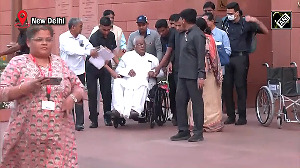The entire moon turned coppery-red as the earth's shadow eclipsed it completely in the early hours of Sunday.
Amateur stargazers and astronomers gathered in large numbers at several places in the country to watch the first total lunar eclipse in three years.
The earth's shadow began creeping on the lunar disc at 1.48 am covering it entirely between 4.14 am and 5.28 am and skywatchers could observe the coppery glow of the moon.
In Delhi, a number of amateur astronomers and skywatchers had gathered at the Nehru Planetarium and India Gate lawns, where NGO Science Popularisation Association of Communicators and Educators had put up telescopes for enthusiasts to watch the celestial spectacle.
"The uniqueness about this eclipse was that it was partly visible on every continent," amateur astronomer and science communicator Vikrant Narang said.
Lunar eclipses occur when earth passes between the sun and the moon, an uncommon event because the moon spends most of its time either above or below the plane of earth's orbit.
The earth's shadow began leaving the moon after 5.28 am and had moved aside completely by 6.42 am.
However, the ending of the partial phase was visible only from the north, north-west and western parts of the country.
In the remaining parts, the moon had set before the end of the eclipse.
The last total lunar eclipse had occurred on October 28, 2004. While parts of Australia, Alaska and New Zealand missed the opportunity, they will be able to watch the next total lunar eclipse on August 28.






 © 2025
© 2025